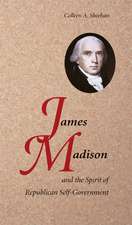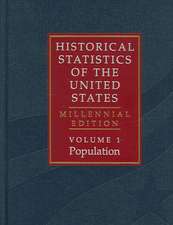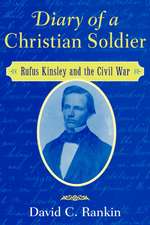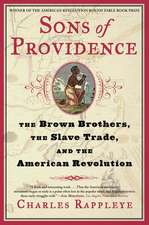The Reign of Terror in America: Visions of Violence from Anti-Jacobinism to Antislavery
Autor Rachel Hope Clevesen Limba Engleză Paperback – 28 mar 2012
| Toate formatele și edițiile | Preț | Express |
|---|---|---|
| Paperback (1) | 270.45 lei 6-8 săpt. | |
| Cambridge University Press – 28 mar 2012 | 270.45 lei 6-8 săpt. | |
| Hardback (1) | 554.63 lei 6-8 săpt. | |
| Cambridge University Press – 5 apr 2009 | 554.63 lei 6-8 săpt. |
Preț: 270.45 lei
Nou
Puncte Express: 406
Preț estimativ în valută:
51.76€ • 53.00$ • 43.05£
51.76€ • 53.00$ • 43.05£
Carte tipărită la comandă
Livrare economică 19 martie-02 aprilie
Preluare comenzi: 021 569.72.76
Specificații
ISBN-13: 9781107403987
ISBN-10: 1107403987
Pagini: 314
Dimensiuni: 152 x 229 x 18 mm
Greutate: 0.46 kg
Editura: Cambridge University Press
Colecția Cambridge University Press
Locul publicării:New York, United States
ISBN-10: 1107403987
Pagini: 314
Dimensiuni: 152 x 229 x 18 mm
Greutate: 0.46 kg
Editura: Cambridge University Press
Colecția Cambridge University Press
Locul publicării:New York, United States
Cuprins
Introduction: revolutionary violence in the Atlantic world; 1. Violence and social order in the early American republic; 2. A scene of confusion and blood: the American reaction against the French Revolution; 3. Mortal eloquence: from anti-Jacobinism to antislavery; 4. Fighting the war of 1812; 5. Disciplining the 'Wild Beast': violence and education; 6. Growing up anti-Jacobin: the Federalist-Abolitionist connection reconsidered; Conclusion: the problem of violence in the Early Republic; Appendix. Digital database citations: American narratives of the French Revolution.
Recenzii
Review of the hardback: 'Historians have had a long debate over the implications of the Calvinist-Federalist response to the French Revolution. In The Reign of Terror in America, Rachel Hope Cleves definitively answers this question by focusing on their passionate condemnation of Jacobin violence and its enduring influence. Federalists feared the spread of violent mayhem to the United States, but as the Jacobin threat waned, they and their children began to turn their sights on the violence of slavery. Cleves establishes beyond dispute the complex ways in which the anti-Jacobin political culture shaped antebellum northern opinion, informing opposition to the War of 1812, the rise of a peace movement, the abolitionist response to slavery, and the northern mobilization for war in 1861. The Reign of Terror in America makes a major contribution to the history of violence in America, and to the history of American political culture.' John L. Brooke, Ohio State University
Review of the hardback: 'The Reign of Terror in America offers a sweeping, intricate, and elegant analysis of how representations of revolutionary violence in France and the Caribbean shaped the political and intellectual culture of generations of thinkers and activists in the United States.' Laurent Dubois, Duke University
Review of the hardback: 'In this outstanding work, Cleves expands our understanding of this age of passion and suggests its long-term significance. Joining a lamentably small but exemplary group of scholars willing to take seriously historical actors who are unsympathetic to most moderns, she finds humanitarianism in what too many historians simply dismiss as an unlikely place: among Federalists and Congregationalist divines. Based on truly exhaustive research in primary and secondary sources, this study centers on the history of violence but radiates out to illuminate many other historiographical concerns, including the histories of antislavery, the first American party system, antiwar sentiment, and education. Her unusually careful and extended efforts to understand the Federalists and their Congregationalist allies allow us to think in fresh ways about their long-term significance.' Matthew Mason, Brigham Young University
Review of the hardback: 'The Reign of Terror in America is a persuasive account of how revulsion to French revolutionary excesses laid the deep foundations of the antebellum antislavery movement. Anti-Jacobinism offered a powerful indictment of democracy run violently amok that inspired reformers to redeem democracy's promise - ultimately by violent means. Rachel Hope Cleves gives us a fresh and provocative perspective on a complicated, crucially important chapter of our national history.' Peter S. Onuf, University of Virginia
Review of the hardback: 'The Reign of Terror in America offers a sweeping, intricate, and elegant analysis of how representations of revolutionary violence in France and the Caribbean shaped the political and intellectual culture of generations of thinkers and activists in the United States.' Laurent Dubois, Duke University
Review of the hardback: 'In this outstanding work, Cleves expands our understanding of this age of passion and suggests its long-term significance. Joining a lamentably small but exemplary group of scholars willing to take seriously historical actors who are unsympathetic to most moderns, she finds humanitarianism in what too many historians simply dismiss as an unlikely place: among Federalists and Congregationalist divines. Based on truly exhaustive research in primary and secondary sources, this study centers on the history of violence but radiates out to illuminate many other historiographical concerns, including the histories of antislavery, the first American party system, antiwar sentiment, and education. Her unusually careful and extended efforts to understand the Federalists and their Congregationalist allies allow us to think in fresh ways about their long-term significance.' Matthew Mason, Brigham Young University
Review of the hardback: 'The Reign of Terror in America is a persuasive account of how revulsion to French revolutionary excesses laid the deep foundations of the antebellum antislavery movement. Anti-Jacobinism offered a powerful indictment of democracy run violently amok that inspired reformers to redeem democracy's promise - ultimately by violent means. Rachel Hope Cleves gives us a fresh and provocative perspective on a complicated, crucially important chapter of our national history.' Peter S. Onuf, University of Virginia
Descriere
In this book, Cleves argues that American fears of the violence of the French Revolution led to antislavery, antiwar, and public education movements.














